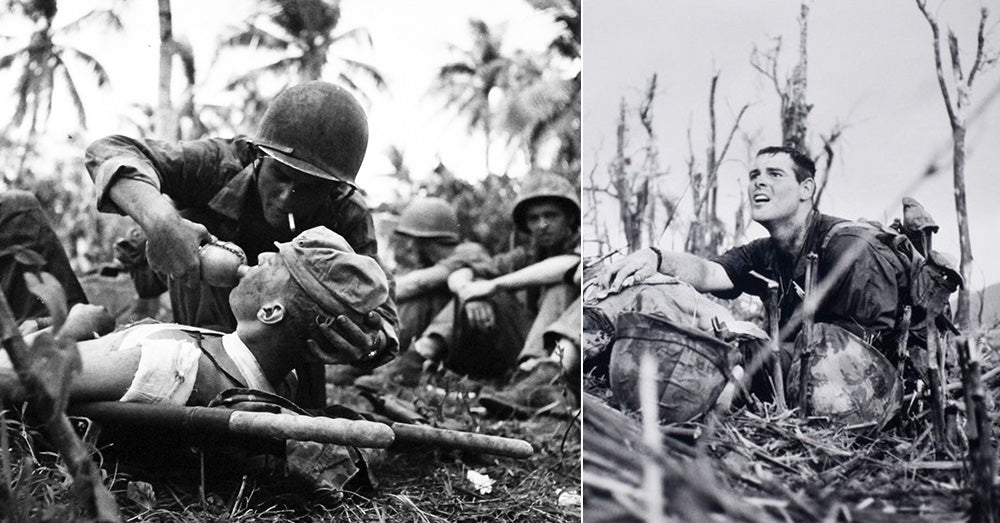True Stories Of The Medics And Navy Corpsman Who Fought To Save Lives In Vietnam
Dan Doyle
Among our military there is one very unique relationship that is like no other. It is the bond between United States Marines and their Navy Corpsmen.
From the beginning, the U.S. Navy and the Marine Corps have fought together in the air, on land and at sea. But the tightest bond of all has always been that between Marines and those few Navy Corpsmen who serve with their Marines in the Fleet Marine Force.
I know, because I was one of those lucky and proud few.
This story is about one of those Navy Corpsmen, Hospital Corpsman 3rd Class, Michael Kuklenski. Like other FMF Corpsmen, he had gone through Navy boot camp, then Hospital Corps School, and then received his orders to the Fleet Marine Force. After Field Medical Service Training and his assimilation into the unique and proud Marine Corps culture he got his orders for Vietnam.
 Source: National Museum of the U.S. Navy, License: Public Domain
Source: National Museum of the U.S. Navy, License: Public DomainU.S. Navy Corpsman gives drink to wounded U.S. Marine on Guam.
In Vietnam he was assigned to Alpha Co., 1st Bn., 7th Marines, 1st Marine Division. He was only in Vietnam for three weeks when he saw his first action. His unit was on a patrol when someone ahead triggered a land mine. In that moment, Kuklenski saw something fly over his head.
It was a boot and part of a lower leg.
Then he heard the shouts from the Marines, “Corpsman Up!”
Three Marines were down in an open field. Kuklenski immediately ran to the wounded men. Two were severely wounded and one was dead. The company’s senior Corpsman was already there. Kuklenski found one of the men had lost both legs below the knee. He immediately put tourniquets on to stem the flow of blood and administered morphine to the man. To his amazement the man suddenly started singing. He started singing Happy Birthday to himself, as it was, apparently, his birthday.
Kuklenski said of the moment, “I’m trying to save his life...And at the same time keep some composure.”
Marines! They really are like no others.
 Source:Wikimedia Commons, License: Public Domain
Source:Wikimedia Commons, License: Public DomainA U.S. Navy hospital corpsman, member of a USAID military health team, inoculates a flood refugee against cholera at the refugee center on Nui Sam mountain, Chau Doc province., 1966.
Kuklenski himself was an unusual man. He was a conscientious objector, but he would show the quality of his courage and the depth of his commitment to his Marines on another occasion shortly after the above event.
On May 29, 1969, Kuklenski was again out in the field with Alpha Co. It had been observed on previous occasions that about 30 NVA soldiers would move through a particular area on a regular basis. They were assigned to set up an ambush in that area on May 29th. Unfortunately, the NVA had seen them setting up the ambush and, instead of 30 NVA, 300 showed up and hit Alpha Co. hard.
Alpha Co. experienced a 70% casualty rate that day and Kuklenski was one of the wounded.
 Source: flickr/Robert Sullivan, License: Public Domain
Source: flickr/Robert Sullivan, License: Public DomainNavy corpsman Vernon Wilke with a dying comrade, near Khe Sanh, South Vietnam, in 1967.
Kuklenski had been hit in both arms and both legs. He was unable to walk, but all throughout the intense battle he dragged himself by his elbows from one wounded Marine to the next, refusing to be treated himself until he had cared for his Marines. For his actions that day, he was awarded the Silver Star with “V” device and the Purple Heart.
There is a strange relationship between battlefield patients and their Corpsmen or medics. It is a paradox of intimate detachment. When you are caring for a wounded Marine, your focus is intimately on that man and his wounds. When you hear that call, “Corpsman Up!” over the din of battle, you start moving toward that cry and your mind starts to focus on the mantra you learned in Field Medical Service School, “Clear the airway, stop the bleeding, prevent or treat for shock.”
 Source: U.S. Navy, License: Public Domain
Source: U.S. Navy, License: Public DomainModern Corpsman training.
You do what you can and what you are trained to do and, if necessary, move on to the next. But in every case you are profoundly aware of the fact that you have another human being’s life in your hands. At age 19 or 20 that’s a lot of responsibility for one to bear, but somehow the training kicks in and you do what you have to do.
Another Corpsman, Jess Johnson, who received a Bronze Star and Purple Heart during his time in Vietnam said of that experience, “I never talked to them again after I medevac’d them. I didn’t know if they lived or died. I just did the best I could.”
That pretty much sums up the experiences I remember as well from my time in Vietnam.
 Source: U.S. Navy, License: Public Domain
Source: U.S. Navy, License: Public DomainCorpsman work on the front lines and in hospitals.
During the Vietnam War 10,000 Navy Hospital Corpsmen served with their Marine brothers. 645 of them were killed in action (KIA) and 3,300 were wounded in action (WIA).
It is said of them that they would “go through the gates of hell for one of their wounded Marines.” But it was also true that their Marine brothers would fight like hell to protect their Corpsmen.
As I said in the beginning of this piece, there is no other relationship or bond like that between Marines and their Navy Corpsmen.
[media height="344" width="459" provider="youtube" type="iframe" src="https://www.youtube.com/embed/1p9Z7AA_A5g?feature=oembed" ad="true"]
The Veterans Site honors Hospital Corpsman 3rd Class Michael Kuklenski and all of the FMF Corpsmen who served with their Marines in Vietnam. You truly are Fratres Aeterni (brothers forever).
Semper Fi!


